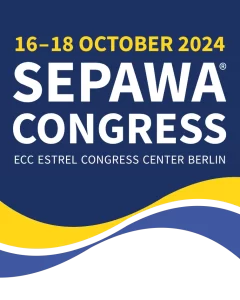
Latest NEWS
Embracing Sustainability: Unveiling the Top 5 Key Trends at SEPAWA Berlin 2024

Sustainable Ingredients and Formulations at SEPAWA Berlin 2024

The first trend that emerged at SEPAWA Berlin 2024 is the use of natural and organic ingredients. Consumers are increasingly seeking products that are free from harmful chemicals and are made from natural sources. Companies are responding to this demand by sourcing ingredients from sustainable and organic farms. This not only ensures that the ingredients are of high quality, but also reduces the environmental impact of the production process.
The second trend focuses on the reduction of packaging waste. Companies are exploring innovative ways to minimize the use of plastic and other non-recyclable materials in their packaging. This includes using biodegradable materials, such as plant-based plastics, and designing packaging that can be easily recycled. By reducing packaging waste, companies are not only contributing to a cleaner environment, but also meeting the growing consumer demand for sustainable packaging.
The third trend highlighted at SEPAWA Berlin 2024 is the development of waterless formulations. Water is a precious resource, and its scarcity in many parts of the world has prompted companies to find alternatives to water-based products. Waterless formulations not only conserve water, but also reduce the carbon footprint associated with transporting and processing water. This trend is particularly relevant in the personal care industry, where waterless products such as solid shampoos and conditioners are gaining popularity.
The fourth trend focuses on the use of renewable energy in the production process. Companies are increasingly investing in renewable energy sources, such as solar and wind power, to power their manufacturing facilities. This not only reduces greenhouse gas emissions, but also helps companies become more self-sufficient and less reliant on fossil fuels. By embracing renewable energy, companies are taking a significant step towards a more sustainable future.
The final trend unveiled at SEPAWA Berlin 2024 is the adoption of circular economy principles. Instead of following a linear model of production and consumption, companies are embracing circular economy principles by designing products that can be recycled or repurposed at the end of their life cycle. This includes using recyclable materials, designing products for disassembly, and implementing take-back programs. By closing the loop and reducing waste, companies are contributing to a more sustainable and resource-efficient economy.
In conclusion, the top 5 key trends in sustainable ingredients and formulations at SEPAWA Berlin 2024 highlight the industry’s commitment to embracing sustainability. From using natural and organic ingredients to reducing packaging waste, companies are taking innovative approaches to create more sustainable products. By incorporating waterless formulations, investing in renewable energy, and adopting circular economy principles, companies are not only meeting consumer demand for sustainable products, but also contributing to a cleaner and greener future. SEPAWA Berlin 2024 serves as a platform for industry leaders to showcase their commitment to sustainability and inspire others to follow suit.
Natural and Organic Personal Care Products: A Growing Trend at SEPAWA Berlin 2024
Natural and Organic Personal Care Products: A Growing Trend at SEPAWA Berlin 2024
SEPAWA Berlin 2024, one of the largest trade shows for the personal care and home care industry, recently unveiled the top five key trends in the industry. Among these trends, the growing popularity of natural and organic personal care products stood out as a significant movement in the market.
Consumers today are becoming increasingly conscious of the ingredients they put on their bodies. They are seeking products that are not only effective but also safe and environmentally friendly. This shift in consumer preferences has led to a surge in demand for natural and organic personal care products.
At SEPAWA Berlin 2024, exhibitors showcased a wide range of natural and organic personal care products, including skincare, haircare, and body care items. These products are made from plant-based ingredients, free from harmful chemicals, and produced using sustainable practices. They offer consumers a healthier alternative to conventional personal care products.
One of the key advantages of natural and organic personal care products is their minimal impact on the environment. Conventional personal care products often contain synthetic ingredients that can be harmful to ecosystems when they enter waterways. In contrast, natural and organic products are biodegradable and do not contribute to water pollution. This eco-friendly aspect of these products resonates with consumers who are increasingly concerned about sustainability.
In addition to being environmentally friendly, natural and organic personal care products also offer numerous benefits for the skin and hair. These products are formulated with nourishing ingredients such as botanical extracts, essential oils, and vitamins. They are gentle on the skin, reducing the risk of irritation and allergic reactions. Many natural and organic products also have anti-inflammatory and antioxidant properties, which can help improve the overall health and appearance of the skin.
Furthermore, the demand for natural and organic personal care products is not limited to a specific demographic. Consumers of all ages and backgrounds are embracing this trend. Younger consumers, in particular, are driving the demand for these products as they prioritize sustainability and wellness in their purchasing decisions. This shift in consumer behavior has prompted many established personal care brands to expand their offerings to include natural and organic options.
The growing popularity of natural and organic personal care products has also led to increased innovation in the industry. Manufacturers are constantly developing new formulations and technologies to meet the evolving needs of consumers. This has resulted in a wider variety of natural and organic products available in the market, catering to different skin types, hair concerns, and personal preferences.
In conclusion, the trend of natural and organic personal care products is gaining momentum at SEPAWA Berlin 2024. Consumers are increasingly seeking products that are safe, environmentally friendly, and effective. The demand for these products is driven by a growing awareness of the benefits they offer for both personal health and the planet. As the industry continues to evolve, it is expected that natural and organic personal care products will become even more prevalent in the market, providing consumers with a wider range of sustainable options for their personal care needs.
Green Chemistry and Eco-friendly Manufacturing Processes: Key Focus at SEPAWA Berlin 2024
SEPAWA Berlin 2024, one of the largest conferences in the personal care and home care industries, recently took place, unveiling the top five key trends in sustainability. Among these trends, green chemistry and eco-friendly manufacturing processes emerged as a key focus for industry professionals.
Green chemistry, also known as sustainable chemistry, is a concept that promotes the design and development of chemical products and processes that minimize the use and generation of hazardous substances. It aims to reduce the environmental impact of chemical manufacturing while still meeting the needs of society. At SEPAWA Berlin 2024, experts from around the world gathered to discuss the latest advancements in green chemistry and its application in the personal care and home care sectors.
One of the key trends highlighted at the conference was the increasing demand for natural and organic ingredients in personal care and home care products. Consumers are becoming more conscious of the potential harm that synthetic chemicals can cause to their health and the environment. As a result, they are seeking out products that are made with natural and organic ingredients. Manufacturers are responding to this demand by incorporating more plant-based and biodegradable ingredients into their formulations.
Another trend that emerged at SEPAWA Berlin 2024 was the development of sustainable packaging solutions. Packaging plays a significant role in the personal care and home care industries, but it also contributes to the growing problem of plastic waste. Industry professionals are now exploring alternative materials, such as bioplastics and compostable packaging, to reduce the environmental impact of their products. Additionally, efforts are being made to improve recycling infrastructure and educate consumers about the importance of proper waste disposal.
In line with the focus on eco-friendly manufacturing processes, the conference also highlighted the importance of energy efficiency and waste reduction. Manufacturers are increasingly adopting technologies and practices that minimize energy consumption and waste generation. This includes the use of renewable energy sources, such as solar and wind power, and the implementation of recycling and waste management programs. By embracing these sustainable practices, companies can not only reduce their environmental footprint but also improve their bottom line by cutting costs.
Furthermore, SEPAWA Berlin 2024 shed light on the role of innovation in driving sustainability in the personal care and home care industries. Researchers and scientists are constantly exploring new ways to develop more sustainable products and processes. This includes the use of green solvents, biodegradable surfactants, and eco-friendly manufacturing techniques. By investing in research and development, companies can stay ahead of the curve and meet the evolving demands of consumers and regulators.
In conclusion, green chemistry and eco-friendly manufacturing processes were the key focus at SEPAWA Berlin 2024. The conference highlighted the increasing demand for natural and organic ingredients, the development of sustainable packaging solutions, the importance of energy efficiency and waste reduction, and the role of innovation in driving sustainability. As the personal care and home care industries continue to evolve, embracing these trends will be crucial for companies to stay competitive and meet the growing expectations of consumers and regulators.
Innovations in Cosmetic and Home Care Packaging at SEPAWA Berlin 2024
Embracing Sustainability: Unveiling the Top 5 Key Trends at SEPAWA Berlin 2024
The SEPAWA Berlin 2024 conference has once again brought together industry leaders and experts to discuss the latest trends and innovations in the cosmetic and home care packaging sector. This year, the focus has been on sustainability, with a strong emphasis on finding eco-friendly solutions that minimize the environmental impact of packaging materials and processes.
One of the key trends that emerged from the conference is the increasing use of recycled and biodegradable materials in packaging. Companies are now actively seeking alternatives to traditional plastic packaging, which is known for its harmful effects on the environment. Instead, they are turning to materials such as recycled paper, cardboard, and bioplastics, which are not only more sustainable but also offer similar functionality and durability.
Another trend that has gained traction is the concept of refillable packaging. Many companies are now offering refillable options for their products, allowing consumers to reuse the same packaging multiple times. This not only reduces waste but also encourages a more circular economy, where resources are used more efficiently. Refillable packaging also provides an opportunity for brands to engage with their customers on a deeper level, as they can offer incentives and rewards for returning empty containers.
In addition to using sustainable materials and promoting refillable packaging, companies are also exploring innovative ways to reduce the overall amount of packaging used. This includes the development of concentrated formulas that require smaller packaging, as well as the use of smart packaging technologies that optimize product dispensing. By minimizing the amount of packaging needed, companies can significantly reduce their carbon footprint and contribute to a more sustainable future.
Furthermore, the conference highlighted the importance of transparency and clear labeling in sustainable packaging. Consumers are becoming increasingly conscious of the environmental impact of their purchasing decisions and are actively seeking products that align with their values. As a result, companies are now providing detailed information about the materials used in their packaging, as well as their sustainability initiatives. This allows consumers to make informed choices and support brands that prioritize sustainability.
Lastly, the conference showcased the growing trend of collaboration and partnerships in the industry. Companies are realizing that addressing sustainability challenges requires collective action and are actively seeking collaborations with suppliers, packaging manufacturers, and other stakeholders. By working together, they can share knowledge, resources, and best practices, ultimately driving innovation and accelerating the adoption of sustainable packaging solutions.
In conclusion, the SEPAWA Berlin 2024 conference has shed light on the top 5 key trends in cosmetic and home care packaging. From the use of recycled and biodegradable materials to the promotion of refillable packaging, companies are embracing sustainability and actively seeking eco-friendly solutions. They are also exploring ways to reduce packaging waste, promoting transparency through clear labeling, and fostering collaboration to drive innovation. These trends not only benefit the environment but also provide opportunities for brands to engage with their customers and build a more sustainable future. As the industry continues to evolve, it is clear that sustainability will remain a top priority for cosmetic and home care packaging.
Consumer Demand for Clean Label and Transparent Products: Insights from SEPAWA Berlin 2024
Consumer Demand for Clean Label and Transparent Products: Insights from SEPAWA Berlin 2024
The SEPAWA Berlin 2024 conference brought together industry experts, researchers, and professionals from the personal care, home care, and fragrance industries to discuss the latest trends and innovations. One of the key topics that emerged from the conference was the growing consumer demand for clean label and transparent products.
In recent years, consumers have become increasingly conscious about the ingredients used in the products they use on a daily basis. They are more aware of the potential health risks associated with certain chemicals and are actively seeking out products that are free from harmful ingredients. This shift in consumer behavior has led to a rise in the demand for clean label and transparent products.
Clean label products are those that have a simple and easily understandable ingredient list. They are free from artificial additives, preservatives, and other chemicals that consumers may find undesirable. These products often use natural and organic ingredients, which are perceived to be safer and more environmentally friendly.
Transparency is another important aspect of clean label products. Consumers want to know exactly what goes into the products they use, and they expect companies to be open and honest about their ingredients and manufacturing processes. This includes providing detailed information about the sourcing of ingredients, the production methods used, and any certifications or third-party testing that has been conducted.
At SEPAWA Berlin 2024, industry experts discussed the challenges and opportunities associated with meeting consumer demand for clean label and transparent products. One of the main challenges is finding suitable alternatives to the chemicals that are commonly used in personal care and home care products. Many of these chemicals have been used for decades and have proven efficacy, but they may not meet the criteria for clean label products.
However, there are also many opportunities for innovation in this space. Companies are investing in research and development to find new and safer ingredients that can replace the chemicals of concern. They are also exploring new manufacturing processes that minimize the use of chemicals and reduce the environmental impact of production.
In addition to finding alternatives to harmful chemicals, companies are also working on improving their transparency and communication with consumers. They are investing in technologies that allow them to trace the origin of their ingredients and provide detailed information about their products. This includes using blockchain technology to create a transparent and tamper-proof record of the entire supply chain.
Another important aspect of meeting consumer demand for clean label and transparent products is education. Many consumers are still unaware of the potential risks associated with certain chemicals, and they may not fully understand the benefits of clean label products. Companies are working on educating consumers about the importance of reading labels, understanding ingredient lists, and making informed choices.
In conclusion, the SEPAWA Berlin 2024 conference shed light on the growing consumer demand for clean label and transparent products. Consumers are increasingly conscious about the ingredients used in the products they use and are actively seeking out safer and more environmentally friendly options. While there are challenges associated with meeting this demand, there are also many opportunities for innovation and improvement. Companies are investing in research and development, improving transparency, and educating consumers to meet the evolving needs of the market.




